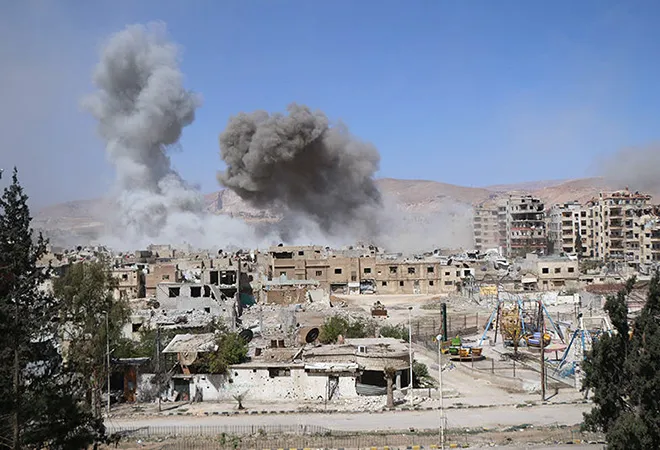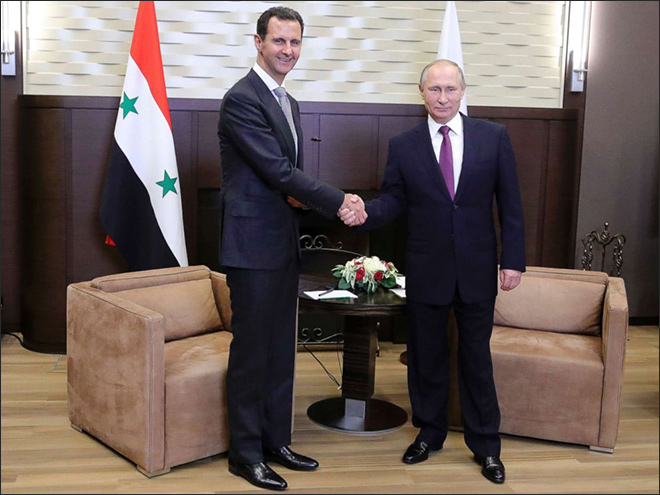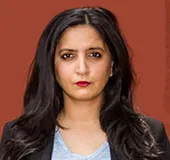
Streaks of a 100 plus precision guided Tomahawk missiles flashed through the Syrian sky minutes before 4 am on the 14 April. The United States of America, the United Kingdom and France struck three sites and claimed the buildings were used for manufacturing and storing of chemical weapons in Syria. The goal was to punish Bashar al-Assad for allegedly conducting chemical warfare on his own people in the city of Douma and deter him from doing so again.
US President Donald Trump called it the fight of the ‘righteous’ powers against ‘barbarism and brutality.’ Describing a video released by a group of anti-Assad activists called White Helmets, which first provoked the collective rage of Washington, London and Paris, Trump said, “The evil and the despicable attack left mothers and fathers, infants and children thrashing in pain and gasping for air." He did not speak of any other evidence in his speech and added, “These are not the actions of a man. They are crimes of a monster instead."
The evidence
The evidence revealed thus far is circumstantial. The first to emerge was a video filmed by a pro-rebel activists group called White Helmets which shows graphic images of children foaming excessively at the mouth and lying lifeless in the arms of their parents, grown-ups sprawled on the floor showing similar symptoms, and bodies piled up on a staircase. The visuals are heart-wrenching and strong enough to catapult anyone from indifference into demanding action, but insufficient before the world gets thrown into a third world war. A US strike ran the possibility of a face-off with Russia, Assad’s strongest ally with assets on the ground and the other nuclear giant in the world.
French President Macron said France has evidence to prove chlorine was used but didn’t specify exactly what the evidence is. Britain’s Prime Minister Theresa May said there were enough indications to suggest the regime was responsible but she too didn’t elaborate. In a leak to American press, unnamed American officials are quoted to be in possession of urine and blood samples of the affected with traces of poisonous gas, yet again, no confirmations.
According to the Syrian American Medical Society or SAMS, which is a group of medics operating on the ground in Douma, and the White Helmets, more than 40 civilians succumbed and 500 displayed signs of a chemical weapons attack after the regime allegedly dropped barrels of chlorine gas mixed with a nerve agent. A week after the attack, SAMS has provided the testimony of one witness.
Independently, this author spoke to one of the residents of Douma through an Arabic translator. He identifies himself as Qias and lived 500 meters from the spot of the alleged attack. He says, “We felt a weird smell in the air. Some people were having trouble breathing so we thought the regime has launched a chemical attack. We started burning matches and cartons to get rid of the smell. In the morning, we woke up dizzy and nauseous and heard on the media there was indeed a chemical attack.”
It isn’t yet substantiated by fool-proof evidence that the people of Douma were indeed subjected to a chemical attack and that the regime was behind it. But testimonies from the ground, albeit few, indicate it may have happened. If France and the US share the evidence they claim to have, it will give their strike more credibility.
For the medics in Douma, it was a clear case of a most horrifying assault on unarmed civilians. Basel Termanini, the Vice President of SAMS, spoke to this author via encrypted communications and asserted, “ no confusion. It is a wide scale chemical attack. The agents used are chlorine with another unknown toxic agent that is more fatal.”
The suspicion on the regime emanates from the history of chemical attacks in Syria. When first asked to give up its chemical weapons stockpile, the Assad regime refused to admit it possessed any.
In 2013, Obama drew a red line -- if there was a chemical weapons attack on the Syrian people, it would warrant military action by the US. To stop Washington from attacking Damascus, Russia intervened and cracked a deal with Obama -- if the US promised to hold back and not attack the regime, Moscow would convince Assad to give up all of Syria’s chemical weapons stockpiles.
It was done or so we were told. The attacks continued.
Trump, it seems, decided to follow the red-line better than his predecessor. Last year, same month, 70 people were killed in a sarin gas attack in Khan Sheikhoun in Idlib prompting Trump to order a limited strike. Russians were informed in advance and Sharyat airbase in Syria was hit by 58 Tomahawk missiles. The damage was minimal and the airbase was functional within 24 hours of the attack. It was seen as a face saving exercise, for whatever Trump may be, the western countries and the Americans see America as the leader of the free world and called for action. Later, the Organisation for Prohibition of Chemical Weapons or the OPCW pinned the blame of the Khan Sheikhoun attack squarely on the regime. The ISIS has also been blamed for using mustard gas by the OPCW in the past, but no other rebel groups have come under such doubt by the organisation.
Unlike the 2013 Douma attack, this time the OPCW received a limited mandate under which they would only ascertain if chemical weapons were used but won’t be in a position to blame anyone for it. On one hand, while the Syrian government invited the OPCW to visit the site of the alleged attack and inspect, at the United Nations Security Council, Russia limited its mandate. The Syrians and the Russians denied there was any attack. Russians said they inspected the site but found nothing. This led to further criticism of Moscow and the American analysts expressed concern that the Russians may have cleaned up the site of any traces. Experts say it is never really possible to clean-up the remnants of a chemical attack entirely, so had the mandate been broader, OPCW would have been able to assess where the weapons used came from.
 Russian President Putin shaking hand with Syrian President Assad
Russian President Putin shaking hand with Syrian President Assad
It is possible that had Russian President Putin agreed to an impartial inquiry, one that allowed the agency to reveal the forces behind the attack, Trump would not have gone ahead with the strikes. But then again, it was also advisable for Washington to wait and see what the OPCW found out before creating an 1982 Cuba missile type panic in the world.
WW-III averted, for now
The images of the alleged Douma attack aired across the world. One viewer, believed to be glued to his television at most times, seemed specifically moved. He did what he thinks he is good at, tweeting.
On 8 April, Trump tweeted: “Many dead, including women and children, in mindless CHEMICAL attack in Syria. Area of atrocity is in lockdown and encircled by Syrian Army, making it completely inaccessible to outside world. President Putin, Russia and Iran are responsible for backing Animal Assad. Big price...”
Big PRICE!! It sounded like Trump had a bigger strike in mind than the 58 Tomahawks he dropped on the Syrian airbase last year. This time, there was an additional challenge. In Idlib, there were no Russian forces but regime-held Syria is full of Russian assets. Fears magnified and the observers of international affairs asked -- how will Trump attack without damaging Russian assets? Will he plunge the world into world war-III? A few days before the attack, Trump had vowed to pull out the 2000 American troops out of Syria and said ‘let others handle it now’. Sans a Syria strategy, Trump took to twitter and sent ripples across continents.
By 11 April, Trump was daring Russia to get ready for ‘nice, new, smart’ missiles which are coming. The warning was conveyed, again, on twitter.
Russia responded with a series of counter threats. Russian ambassador to Lebanon threatened the American with not just strikes on the missiles if spotted by Russia’s impressive air defence systems but also assured that the Russians would return the favour in equal measure by hitting the launch pads.
The Russian military weighed its words more carefully and said that Moscow will respond if any Russians are killed or Russian assets are damaged.
In time, it seems, someone whispered the meaning of his tweet in the ears of the American President. By the next day, Trump’s tune changed. On 12 April, he dialed back on the rhetoric and worked his fingers on the social media app mildly. He wrote: “Never said when an attack on Syria would take place. Could be very soon or not so soon at all! In any event, the United States, under my Administration, has done a great job of ridding the region of ISIS. Where is our “Thank you America?”
Trump is known to be flaky with his words, nonetheless this tweet instilled a certain relief. Now the work bestowed on the Pentagon was the choice of targets - hit but by bypassing Russian radar and without causing any damage to the Russians.
The safest way deemed was to attack infrastructure a part of Assad’s chemical industry but away from Moscow’s men.
110 precision guided missiles were launched towards Syrian edifices demolishing the alleged chemical weapons facilities, and avoiding Russians entirely. The concerned breathed a sigh of relief for the third world war was averted.
After all the rhetoric, the strike was lame. Even though Trump would have you believe the strikes would prove to be a deterrent “to the production, spread, and use of chemical weapons”, few buy his claim. This strike, as the one April last year, is not expected to carry out any meaningful change in the Syrian theatre.
Assad’s message: It is business as usual
Holding a brief case, strolling down a marbled floor presumably in his office, Bashar al-Assad appeared on television screens in Syria hours after the multiple strikes. Assad’s message to his supporters – he is the winning candidate and their best bet.
Most of the Syrians in Assad’s territory profess loyalty to him but for varying reasons. Some simply prefer him as a leader because they have a stake in the power sharing. Others have bought Assad’s narrative that it is him vs the extremists in this war. That is partially true because the Syrian war has had many extremists rebel groups like ISIS and Al-Qaeda’s affiliate Jabhat al-Nusra now named Hayat Tahrir al-Sham.
A large part of support to Assad is also increasingly a nationalist calling. Those who oppose him are Syrians but backed by outsiders like Saudi Arabia, Qatar and Turkey. Seeing foreign meddling for over 7 years, in Syria the fence sitters are increasingly favouring Assad.
Nationalist Syrians stepped in the cars and drove on the streets waving the Syrian flag and sloganeering agianst America.
Tariq, a Damascene, assesses the damage of the strikes as little but says his compatriots – those supportive of the regime – are furious at Trump.
“I am driving around Damascus, everything is fine. People are collecting and demonstrating in public square against the U.S.” he told this author. Speaking about the mood on the street, he said, “People are going about their daily business and no one is running away from Damascus, no one stocked up on supplies fearing war. In 2013 when Obama threatened, the reaction was much different.”
According to Tariq, the building the US shelled in Damascus was destroyed earlier too but was functional, though in the last days, he says, the regime had emptied it.
“All that the American bombs destroyed there was concrete.”
Syrians rendered homeless and seeking refuge in areas on Syria-Turkey border in the North welcomed the strikes but were unhappy with the scope of the operation. They want Assad out but that goal Trump and May clarified they don’t share.
Pointless strikes
The American, British and French response is directed towards domestic consumption and a feeble attempt at maintaining their diminishing status as the upholders of human rights in the world. The citizens of these countries, to a large extent, continue to display a more moral approach to global crises forcing their administrations to be more pro-active at times such as these when news of alleged chemical attacks emerge. A 100 rockets though don’t make up for a strategy. If the idea was to dissuade Assad from conducting chemical attacks, it isn’t clear how that has been achieved. Especially since Assad and Putin are sticking to their argument that there are no more chemical stockpiles in Syria.
The strikes seem rather pointless. Assad will stay and now Douma too is under his control.
The views expressed above belong to the author(s). ORF research and analyses now available on Telegram! Click here to access our curated content — blogs, longforms and interviews.




 Russian President Putin shaking hand with Syrian President Assad
Russian President Putin shaking hand with Syrian President Assad PREV
PREV


